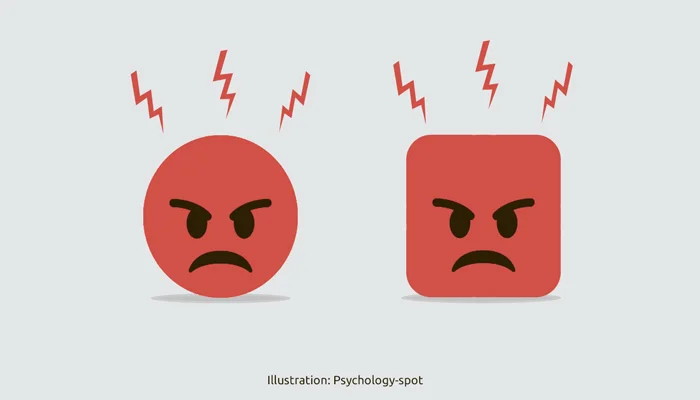
“Are you angry?” someone asks you to confirm what is obvious and then finish with a tone halfway between disbelief and reprimand: “but, why are you angry? ”, although they probably know the reasons very well.
This scenario, increasingly common, is the result of the increasingly widespread tendency to denigrate the so-called “negative” emotions, blaming the person who experiences them for the simple fact of being human or, what is even worse, not being able to hide convincingly enough what they feel.
And in times of screwed smiles and toxic positivity, emotional honesty is not in fashion. There are fewer and fewer people capable to deal with the emotions of others, not only anger, but also sadness or disappointment, without resorting to phrases made in the purest happy flower style .
What is anger for?
Anger gets a very bad pubblicity. We tend to think of it as a terrifying, destructive and unwanted emotion. We imagine the disastrous consequences of expressing that rage or anger and we try to avoid what we consider a “dangerous” emotion.
Of course, anger has undeniable destructive potential, but it is neither good nor bad in and of itself. It depends on how we express it. In fact, anger has adaptive functions, just like the rest of the emotions.
- It protects us. It may seem strange, but anger safeguards us from a potential enemy or a dangerous situation. It makes us pay attention to threats in the environment and sharpens our attention. In fact, when we feel threatened or attacked, anger pushes us to fight back, act quickly, and defend ourselves.
- It motivates us. Anger is one of the emotions with the greatest power to drive behavior that exists. A series of experiments recently conducted at the University of Texas revealed that anger motivates people to be more persistent in achieving goals, especially when they represent a challenge. And the level of physiological activation that causes this emotion can be channeled positively as additional energy to achieve our goals.
- It guides us. Anger is also a kind of moral compass. It is no coincidence that it usually arises when someone violates our rights or those of another person. This emotion is activated when we experience or witness a situation that goes against our values, encouraging us to intervene to fight for what we believe is fair and defend the respect that we all deserve.
As bizarre as it may seem, anger could even “improve” our relationships. As long as it is truly justified, expressed assertively, and focused on finding solutions, it could be helpful for the relationship. How is it possible?
A classic psychology study revealed that, in the long term, repressing anger is usually worse because all that resentment is likely to accumulate, so it will come out in the worst way. Additionally, not pointing out what makes us angry right when it bothers us can give the green light to the other person’s harmful or disturbing behavior. On the other hand, immediately expressing what upsets and irritates us serves to put a stop to that behavior, preventing it from being repeated and leading to a deterioration in the relationship.
Therefore, the problem is not anger itself. Getting angry is normal. And sometimes it’s even perfectly adaptive. We just have to learn to deal with that anger and irritation – and managing those emotions is not about ignoring them, repressing them or hiding them, as if we had to be ashamed of them, but about expressing them appropriately.
The art of getting angry and using anger assertively to your advantage
“Anyone can get angry, that’s easy; but getting angry with the right person, with the right intensity, at the right time, with the right purpose and in the right way, that is not so easy nor is it in everyone’s hands, ” Aristotle said centuries ago.
Many ancient philosophers, as well as Eastern philosophies, believed that the key to living more serenely lies in seeking balance. They understood that all emotions are important and have a reason for being. The secret is to prevent them from guiding our decisions and not cling to them, so that they disappear just as they came.
I propose a little experiment: hold a glass full of water with your arm extended forward. If you hold it for 5 minutes and then leave it on the table, nothing notable will happen. But if you keep your arm extended for an hour, that simple exercise will become torture.
The same goes for emotions.
Unlike feelings, emotions are intense but temporary states, unless you hold on to them. Therefore, fear, annoyance or anger will disappear if you learn to manage them.
And part of that management consists of expressing what we feel without attacking the other, but also in using that anger in a constructive way. Research carried out at Yale and Hofstra universities found that, regardless of cultural differences, 55% of people who became angry recognized that anger generated a positive result because it helped them get to know themselves better and learn from their mistakes or deficiencies.
Therefore, anger is not public enemy number one and we should not feel ashamed for getting angry either. We often get angry about things that are meaningful to us, simply because we are human beings. We just have to learn to control anger to use it constructively and intelligently, instead of getting carried away by it.
Therefore, feel the anger.
Take it easy.
Think.
And then ask yourself what you can do.
References:
Lench, H. C. et. Al. (2023) Anger Has Benefits for Attaining Goals Heather. J Pers Soc Psychol; 10.1037: 1-16.
Kassinove, H. (1997) Self-reported anger episodes in Russia and America. Journal of Social Behavior & Personality; 12(2): 301–324.
Baumeister, R. F. Stillwell, A. & Wotman, S. R. (1990) Victim and perpetrator accounts of interpersonal conflict: Autobiographical narratives about anger. Journal of Personality and Social Psychology; 59(5): 994–1005.



